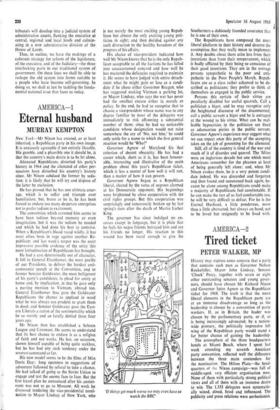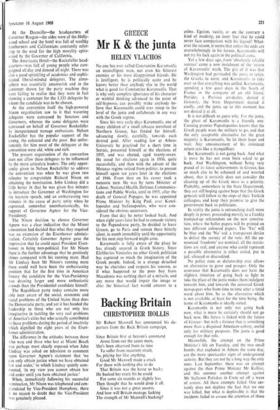Tired ticket
AMERICA-2 PETER WALKER, MP
History may express some concern that a party that contains such men as Governor Nelson Rockefeller, Mayor John Lindsay, Senator 'Chuck' Percy, together with seven or eight other outstanding senators and young gover- nors, should have chosen Mr Richard Nixon and Governor Spiro Agnew as the Republican ticket for 1968. The truth is that the more liberal elements in the Republican party are at an immense disadvantage so long as the leadership is chosen by a convention of party workers. If, as in Britain, the leader was chosen by the parliamentary party, or if, as is being increasingly advocated, by a nation- wide primary, the politically impressive left wing of the Republican party would stand a far better chance of gaining the leadership.
The atmosphere of the three headquarters hotels at Miami Beach, where I spent last week attending my seventh American party convention, reflected well the difference between the three main contenders for the nomination. The Hilton Plaza—the head- quarters of the Nixon campaign—was full of middle-aged, very efficient organisation men. None of them with particularly strong political views and all of them with an immense desire to win. The 1,333 delegates were systematic- ally wined, dined, feted and influenced. The publicity and press relations were Perfectionist At the Deauville—the headquarters of Governor Reagan—the aides were of the Holly- wood school and the hotel was full of wealthy Southerners and Californians constantly refer- ring to the need for the high morality epito- mised by the Governor of California.
The Americana Hotel—the Rockefeller head- quarters—was full of young people who cam- paigned all day and danced all night. There was also a good sprinkling of academics and sophis- ticated liberal-minded delegates. The atmo- sphere was essentially amateurish and in the contempt shown for the party machine they were failing to realise that they were in fact showing a contempt for the 1,333 delegates by whom the candidate was to be chosen.
At the convention itself the high-powered Nixon organisation saw to it that wavering delegates were canvassed by Senators and Governors, whereas the same delegates were canvassed on behalf of Governor Rockefeller by inexperienced teenage enthusiasts. Nelson Rockefeller has the popular support of the young, the coloured and the poor. But unfor- tunately for him most of the delegates at the convention were old, white and rich.
The present organisation of the convention does not allow these delegates to be influenced by the more articulate leaders. The only oppor- tunity given to Nelson Rockefeller to address the convention was when he was given two minutes to congratulate Richard Nixon on obtaining the nomination. John Lindsay did • a little better in that he was given five minutes to introduce the Governor of Washington for the keynote speech, and an embarrassing two minutes in the cause of party unity when he expressed, somewhat unenthusiastically, his support of Governor Agnew for the Vice- Presidency.
The Nixon decision to choose Governor Agnew was a clear indication that the Miami convention had decided that what they required was an extension of the Eisenhower adminis- tration. Certainly Governor Agnew gave the impression that he could equal President Eisen- hower in being non-political. For Mr Nixon there is the further advantage that he positively shines compared with his running mate. Had Mr Lindsay been Mr Nixon's running mate there could well have been the embarrassing position that for the first time in American history the candidate for the Vice-Presidency was drawing larger and more enthusiastic crowds than the Presidential candidate himself.
The Republican party today contains more able men aware of the social, economic and racial problems of the United States than does the Democratic party, and yet it has handed the leadership to those who are not only less imaginative in tackling the very real problems of America's cities but who actually contributed to those problems during the period of inactivity which dignified the eight years of the Eisen- hower administration.
The difference in the attitudes between those who won and those who lost at Miami Beach was perhaps most clearly exposed- when John Lindsay was asked on television to comment upon Governor Agnew's statement that 'we can only obtain justice when we have obtained law and order,' to which Lindsay quietly com- mented, 'in my view you cannot obtain law and order until you have obtained justice.'
When, immediately following his successful nomination, Mr Nixon was telephoned and con- gratulated by Vice-President Humphrey, there is no reason to doubt that the Vice-President was genuinely pleased. •



































 Previous page
Previous page